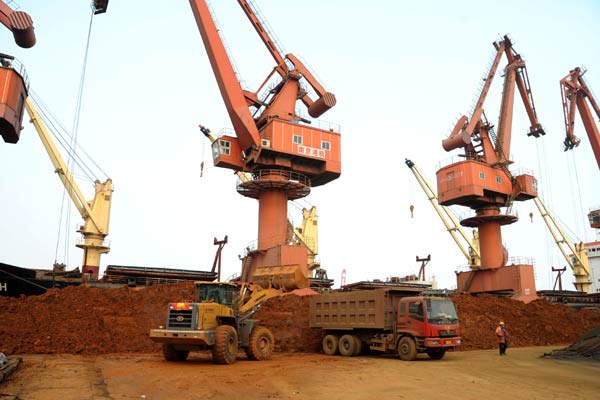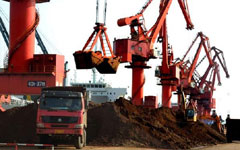 |
|
A wheel loader loads a truck with rare earth to be exported next to a row of cranes at the Port of Lianyungang in Jiangsu province. China has announced the second batch of rare earth export quotas for this year, and it has shown no signs of expanding the quotas this year. Provided to China Daily |
Rising global demand for minerals unlikely to trigger major changes
The Ministry of Commerce has announced the second batch of rare earth export quotas for this year, and it has shown no signs of expanding the quotas this year, even amid rising global demand for the minerals.
The export quota includes 13,691 metric tons for light rare earths, down 130 tons from last year, and 1,809 tons of medium and heavy rare earths, up 130 tons.
The total export quota this year is 30,610 tons, down 389 tons from last year.
Rare earths are a group of minerals that have a wide range of uses in high-technology sectors such as defense and renewable energy.
 |
 |
Prices of some rare earths have fallen to 10-year lows, according to Du Shuaibing, an analyst at natural resources consultancy BaiChuan Information.
Du said the size of the second batch of quotas indicated that the scale of export quota of the system will remain unchanged this year, ending rumors of the removal of the system.
The World Trade Organization in late March ruled that China had acted inconsistently with WTO rules with regard to export measures imposed on rare earths. Two years earlier, the European Union, Japan and the United States joined to bring a case to the WTO over China's measures involving exports of rare earths, tungsten and molybdenum.
Du estimated China's quota system will remain in place until 2015. In the past few years, global demand for rare earths was relatively low, and many export quota allocations were not used.
For example, in 2011, only 52 percent of the quota was used. Even last year, only 72.5 percent of the quota was used. Du said things are set to change this year, however, as quotas will be used up this year.
China already accounts for 90 percent of global rare earth supplies.
After the WTO ruling in March, government bodies began to discuss tax changes for the industry during the second half.
Taxes would be imposed based on the value of the minerals, rather than on volume as is the case at present. That shift will mean higher prices at the producer level, which the government hopes will reflect the scarcity of these resources and the environmental costs of their extraction.
